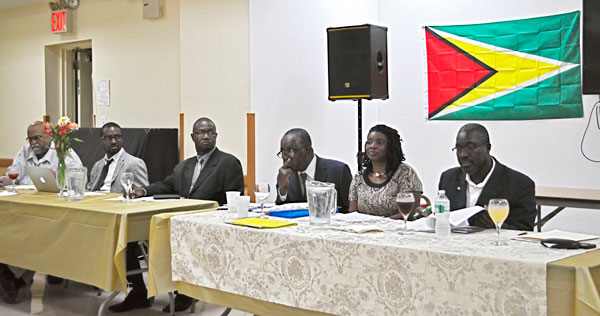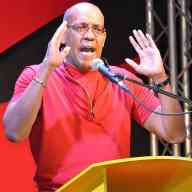Ahead of President David Granger’s presentation to the 70th UN General Assembly on Sept. 28, nationals in the Diaspora are urging the head of state to draft a resolution to discuss Venezuela’s renewed claim of Guyana’s Essequibo region.
The 116-year-old conflict between the two South American states was a topic of discussion recently at St. Gabriel’s Church Hall in Brooklyn, where President of the Guyana American Patriotic Forum, (GAPF), Attorney-at-Law Colin Moore, argued that Venezuela’s Nicolas Maduro’s claim of 58,000 sq miles, or two-thirds of the mineral rich Essequibo region is illegal.
Moore wants Guyanese to also lobby President Barack Obama, Congresswoman Yvette Clarke, Congressman Hakeem Jeffries, and other politicians, to intervene before Maduro volatile behavior escalates to a military strike by the embattled country, that has disputes with Trinidad & Tobago, Barbados, St. Vincent and the Grenadines and Grenada.
“Venezuelans will be going to the polls in December 2015 and because of his unpopularity, Maduro expects the opposition to win, or a coup d’etat by military to kick him out so he is under pressured to do something drastic to prove that he is control,” said Moore who was part of the panel bent on continuing their protest in front of the Venezuelan Embassy in New York City, and outside of the United Nations building.
The politician recalled Venezuela’s attack on the country’s mineral heartland — Orinoco Island — six months after Guyana’s Independence in 1966, and warns that another attack is imminent. He also condemned the Spanish nation for arresting the captain of an American ship, authorized by Guyana to drill for oil in the Exclusive Economic Zone (EEZ), just off the Venezuelan coast.
Emphasizing that this region has Guyana’s greatest tourist resources, namely the Kaieteur Falls, the tallest single drop waterfall in the world, Shell Beach that is home to the world’s endangered marine turtles, Iwokrama International Centre for Rainforest Conservation, as well as one of the world’s largest cattle ranches, gold, titanium, manganese and timber, Moore added that Guyana must fight to keep.
Members of the community that included Assemblywoman Roxanne Persaud, and members of GAPF, Eustace Hall and Pamela Lambert, heard the panelists of Dr. Terrance Simon, Dr. Michael Ralph professor at NYU, Labor Unionist Chuck Mohan and Attorney-at-Law Derrick Arjune’s impassioned plea to keep Guyana’s sovereignty in the region.
Arjune recapped the integrity of the 1899 arbitral award where Great Britain and Venezuela signed the Treaty of Washington allowing the countries to discuss the border row.
According to the political activist, the Spanish rejected the award at the 17th session of the General Assembly of the UN, and objected to British Guyana being granted independence.
The land claim controversy, of which Cuban’s Fidel Castro had agreed upon with former Venezuelan president Hugo Chavez due to his relationship with then president Forbes Burnham is now renewed and political activist Noel Moses is calling on the Guyana government to educate its masses about this ongoing threat to their homeland.
He noted that Venezuela is using its PetroCarib oil initiative, to gain influence in the Caribbean so that it would be easy to claim two-thirds of Essequibo, Demerara and Berbice.
“Venezuela said they would be issuing identification cards in Essequibo to claim nationals who live there. We are dealing with a very aggressive country. We must take a pro-active approach because we cannot fight Venezuela’s army which is larger than Guyana’s population,” said Moses.
In the meantime, Vice President and Foreign Affairs Minister Carl Greenidge during a visit to Miramar, Florida earlier in the month, said he is pleased with the interest shown and the commitments of support for Guyana on the Guyana-Venezuela issue, according to community leader Wesley Kirton.
According to Kirton, Greenidge made it clear that the only option to which Guyana could agree was to seek judicial settlement via the International Court of Justice, and it was up to UN Secretary General Ban Ki Moon to do his job and help the process towards a judical settlement on this claim.
























